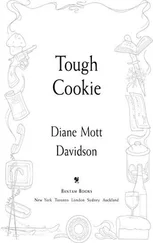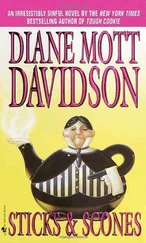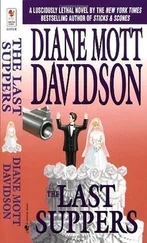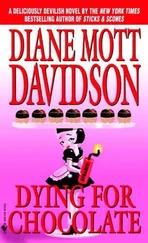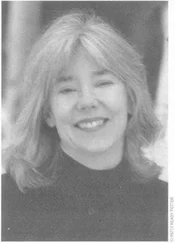“Since never,” I replied angrily, “and she’s on some weird lemon-and-rice diet—”
“Not anymore, she isn’t. You coming down here or what? I probably won’t be able to stay. The investigation of the death over in the mall garage is getting under way.”
I replied that I was on my way and that he shouldn’t wait for me. I scribbled a note to Arch: Back by dinner . How was I going to tell Arch what had happened to Julian or Marla? He adored them both. Stepping out the back door, I glanced around to make sure the Jerk wasn’t lurking in the bushes. That would have been typical of him. I also checked the van’s rear area. It was empty. I locked the doors, gunned the engine, and let the speedometer needle quiver past seventy as I raced back to Denver. I wished I didn’t know as much as I did about the statistics of heart disease running in families.
My best-friendship with Marla had blossomed out of the bitterness of being divorced from the same horrid man. I shook my head and thought of the cloud of brown cocoa powder erupting as it hit the wall. To get emotional control over his cruelty, Marla and I alternately reviled and ridiculed John Richard. But through the years, the relationship between Marla and me had deepened beyond our mutual crisis. We’d formed a discussion group called Amour Anonymous, for women addicted to their relationships. I zipped past Westside Mall and headed for the parking lot at Southwest Hospital.
Our Amour Anonymous meetings had been alternately heartfelt and hilarious. And when the group petered out, as those kinds of groups tend to do, Marla and I remained steadfast to each other with daily phone calls and long talks over shared meals. Moreover, Marla’s generosity with her considerable wealth meant not only that she was one of my best clients, but that she also referred me to all her rich friends. The people in Marla’s address book had provided an endless stream of assignments for Goldilocks’ Catering, including Babs Braithwaite of the upcoming Independence Day party.
My hands clutched the steering wheel. If the Jerk was right and they wouldn’t admit me to the CCU, I was going to have to come up with some way to talk my way in. Just thinking of John Richard made my flesh crawl. How dare he break into my house and blame my cooking for what had happened to Marla? Of course, that kind of behavior was nothing new for him. John Richard Korman, whose mother had been a hardcore alcoholic, frequently had just enough whiskey to release the enraged demon that lived inside.
But there was some truth in what he said. Marla was indeed a large-bodied woman. She ate with gusto, then dieted remorsefully, never for very long or to much effect. Eventually she always resumed her passionate affair with chocolate chip cookies—and cream-filled cakes. But what worried me more than her erratic eating habits was her phobia concerning doctors and hospitals. I wasn’t surprised to hear that she hadn’t seen her general practitioner for years.
I pulled the van into the hospital lot. Southwest Hospital was a subsidiary of a Denver chain of medical facilities. When Westside Mall was in the process of being refurbished, fundraising and construction began on the new hospital. There was another irony: For all her disdain for doctors, Marla had been one of the most generous donors to Southwest Hospital’s building fund.
Inside the hospital, I followed yellow-painted footprints and then blue ones until I came to the automatic doors of the Coronary Care Unit entrance on the fourth floor. A red-haired receptionist wrinkled her brow at me.
“Name of patient?”
I tried to look both innocent and deeply bereaved. “Marla Korman,” I replied.
“She can see visitors only the first ten minutes of each hour, and that’s just past. You’ll have to wait an hour.”
I said quickly, “She’s my sister. Surely I can see her?”
“And you are …”
“Goldy Korman.”
She consulted a clipboard, then gave me a smug smile. “Is that so? When we asked her about next of kin, she didn’t list you.”
“She’d just, had a heart attack,” I said with an enormous effort at long-suffering bereavement. “What do you expect? I really need to see her. I’m worried sick.”
“I’ll have to see some ID.”
Think . I rummaged through my purse and brought out my sorry-looking fake-leather wallet with its wad of credit card receipts and expired grocery coupons.
“ID?” the receptionist repeated serenely.
Wildly, I wondered how I’d talk myself out of this one. Then I had an inspiration. Well, of course. My fingers deftly pulled out a dog-eared card. Good old Uncle Sam! I handed the nurse my old Social Security card.
“Goldy Korman,” she read, then shot me a suspicious look. “Don’t you have a driver’s license or something?”
I bristled. “If my sister dies while you’re doing the Nazi documentation routine, you’ll never work in a hospital in this state again.”
The receptionist snapped the Social Security card with my old married name onto her clipboard and said to wait, she’d be right back. Well, excuse me, after notifying the federal government of the name change to go with my social security number, I had tried to get a new card. I had called the Social Security Administration numerous times after my divorce, when I’d resumed my maiden name. Their line was always busy. Then I’d called them thirty more times this spring, five years after the divorce, when I remarried and assumed the surname Schulz. Again I’d written to them about the name change. All I wanted was a new card. The line was still busy. If people died listening to that bureaucracy’s busy signal, did their survivors still get benefits?
The red-haired receptionist swished back out. Apparently my old ID had passed muster, because she led me wordlessly through the double doors of the CCU. Curtained cubicles lined two walls, with a nurses’ station at the center. I tried desperately to summon inner fortitude. Marla would need all the positive thoughts I could send her way. I was handed over to a nurse, who motioned me forward.
On a bed at the end of the row of cubicles, Marla seemed to be asleep. Wires and tubes appeared to be attached to every extremity. Monitors clustered around her.
“Ten minutes,” said the nurse firmly. “Don’t excite her.”
I took Marla’s hand, trying not to brush the IV attached to it. She didn’t move. Her complexion was its normal peaches-and-cream color, but her frizzy brown hair, usually held in gold and silver barrettes, was matted against the pillow beneath her head. I rubbed her hand gently.
Her eyes opened in slits. It took her a moment to focus. Then, softly, she groaned. To my delight her plump hand gave mine the slightest squeeze.
“Don’t exert yourself,” I whispered. “Everything’s going to be fine.”
She moaned again, then whispered fiercely, “I am perfectly okay, if I could just convince these idiots of that fact.”
I ignored this. “You’re going to be just fine. By the way, in case anybody asks, I’m your sister.”
She appeared puzzled, then said, “I’m trying to tell you, there’s been some mistake. I had indigestion . That’s all.” Denial, I knew, is common among heart attack victims, so I said nothing. “Goldy,” she exclaimed, “don’t you believe me? This whole thing is a misunderstanding. I woke up feeling just a little under the weather, and you know how damn hot it’s been.” She twisted in the bed, trying to get comfortable. “So I went for a jog around the lake. I started to feel much better. Nice and cool. Refreshed. Of course, I wasn’t going very fast. I was even thinking you and I could go out for lunch if you weren’t busy. And then I remembered you were doing that cosmetics lunch, which I had decided to skip because I felt so fat.”
Читать дальше



